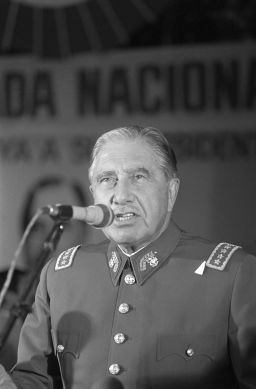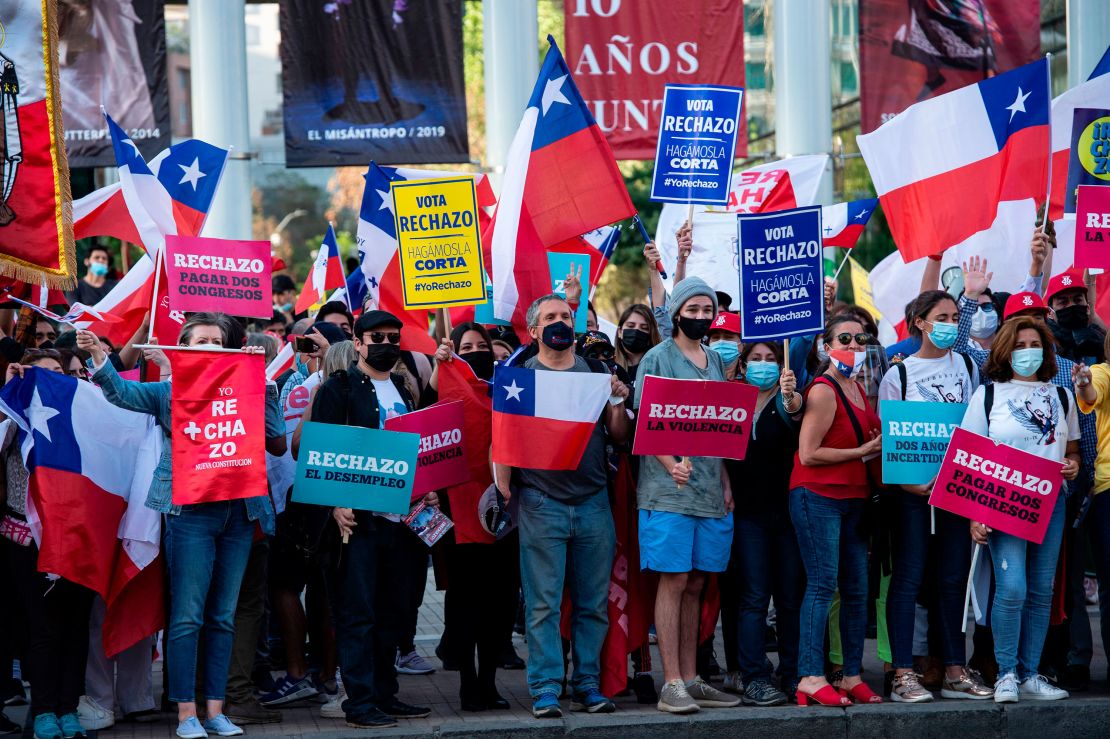For a country at peace, Chile has seen plenty of recent turmoil. Churches were set ablaze and hundreds arrested during protests in the capital Santiago last weekend, nearly a year after at least 26 people died in fierce clashes over a transit fare hike.
The unrest has roiled a country hailed by the World Bank as “one of Latin America’s fastest-growing economies” but where there is deep-seated anger over government policies seen as favoring the rich.
It’s the tumultuous stage for a referendum Sunday to decide whether the country should replace its 40-year-old constitution, written during the dictatorship of Augusto Pinochet.
Patricio Navia, a Chilean-born professor of Latin American and Caribbean Studies at New York University, said many Chileans find it unacceptable to be ruled by a document written during one of the darkest chapters of Chile’s history.
“It’s like someone who owns a beautiful house, but they don’t want it anymore because it was built by a father who was a rapist. It’s not that the house is bad. It’s that it was built by that father,” he said.

“Writing a new constitution is an act of atonement,” Navia said. “Since Chileans couldn’t put Pinochet in jail for human rights violations, they now want to kill the constitution as an historical trial of sorts against him.”
Pinochet died at age 91 in 2006, not having been convicted of any crimes. However, opponents say that more than 3,000 people died as a consequence of political violence under his rule, notably during “Operation Condor,” a campaign against political dissidents during the mid-1970s, including many whose bodies or fates have never been known. Many thousands more were tortured in secret detention centers or intimidated into exile.
Why are Chileans protesting today? The World Bank noted that the country’s “solid macroeconomic framework” has allowed Chile to slash the number of those living in poverty from 30% in 2000 to 3.7% in 2017. But, according to analysts who spoke to CNN, pervasive inequality has produced deep resentment among those marginalized and unable to share in the country’s riches. The OECD reported in 2018 that the income inequality gap was more than 65% wider than the organization’s average “with one of the highest ratios” between the average income of the wealthiest 10% and the poorest 10%.
“Not only are they not getting a slice of the cake, they haven’t even been invited to the party,” Navia said. “And the demand for a new constitution is precisely that, a demand to be invited to the party.”
Creating a new constitution was espoused by the first leftist leaders after the fall of the military dictatorship in 1990. President Ricardo Lagos promoted the biggest reforms in 2005 – and the current constitution includes more than 250 amendments – and presidential candidates first seriously discussed the idea of a referendum in the 2009 campaign.
“The current one has a serious legitimacy problem,” said Gabriel Boric, one of the leftist legislators who pressed for a referendum. “On the one hand, we have pressing social needs like pensions, reducing salaries to legislators, increasing taxes on the rich, freezing the cost of utilities. On the other hand, there’s a deeper question about leveling the playing field. What’s the common framework that governs all of us?”
More than 14.8 million Chileans are eligible to vote Sunday and several polls show that at least 70% favor drafting a new constitution. If approved, it will take more than a year to finish writing the new text.
Chileans are not only deciding whether they get a new constitution, but who’s writing it and how. If as expected creating a new constitution is approved, a constitutional assembly would be chosen in April 2021 at the same time municipal and regional elections are expected to be held.

For Camila Vallejo, a Communist Party member of the Chamber of Deputies and a former student leader, writing a new constitution is about social justice.
“It’s not only about education and health, but also the high cost of electric bills, expensive fuel and public transportation. Chile is the only country in the world where water is completely privatized. We have an extreme neoliberal model which has deepened inequality,” Vallejo told Cenital, a Chilean news website.
But others say writing a new constitution may not be the best way to solve Chile’s problems which are similar to challenges facing other Latin American countries, including lack of sustainable growth, poor job creation and endemic inequality.
Pedro Pizano, a Public Interest Legal Fellow at the McCain Institute for International Leadership, says getting rid of the current constitution is “not only a bad idea, it’s also a terrible way of trying to deliver the change many Chileans desire.”
The Colombian-born analyst says his own country tried this experiment in 1991, assembling 100 people to write a new constitution in five months with mixed results.
Everything Chileans want, Pizano said, “can be addressed by amendments such as we’ve done in the United States rather than rewriting the whole text.”
“Can one create prosperity and fairness from a blank slate? Why hasn’t the United States switched its own constitution even though we have amended it 27 times? Israel and the United Kingdom don’t have written constitutions. Yet they are in some ways examples of liberal, democratic countries. And that’s what we want,” Pizano said, noting that the best-written constitution does not guarantee everything Chileans want.
Navia, the NYU professor, agrees, saying legislators should focus on improving the economy.
“You can’t write it into the constitution that there will be better pensions. You need the money for the pensions first. And you can achieve that with better growth, more foreign investment and several other improvements that a new constitution may end up making it more difficult to obtain.”
Christopher Ulloa reported from Santiago, Chile

